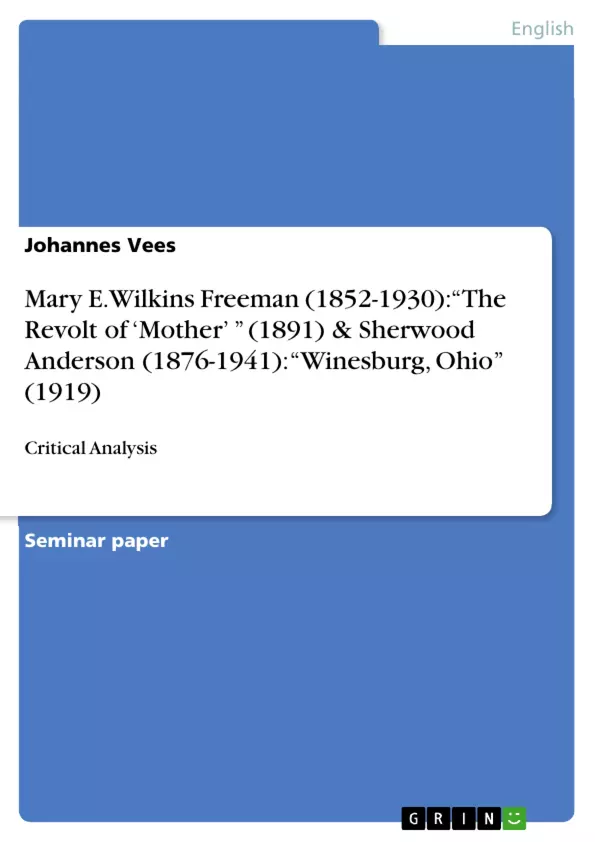HABE Mut, dich deines eigenen Verstandes zu bedienen!” This saying by German philosopher Immanuel Kant, one of the main representatives of the epoch of enlightenment, says: “Have courage to help yourself with your own brain!” It is much more than just a dogmatic proverb, which can be seen by the fact that it has not only revolutionized humanity’s confidence in its own mind in an age when self-reliant mental activity was a foreign word, but also by its timelessness. There’s reason to argue its applicability both in Mary E. Wilkins Freeman’s “The Revolt of ‘Mother’ “, written in 1891, and Sherwood Anderson’s “Winesburg, Ohio”, composed in 1919. However, making use of autonomous thoughts does very often only avail if those are articulated adequately. Both works state that an inability or reluctance to express oneself respectively results in a loss of self-determination.
Table of Contents
- Mary E. Wilkins Freeman: "The Revolt of 'Mother'"
- Sherwood Anderson: "Winesburg, Ohio"
- Conclusion
- Bibliography
Objectives and Key Themes
This analysis explores the themes of self-expression and the power of language in Mary E. Wilkins Freeman's "The Revolt of 'Mother'" and Sherwood Anderson's "Winesburg, Ohio". The analysis examines how the characters' ability to communicate their needs and desires influences their sense of self-determination and their relationships within their respective contexts.
- The significance of articulation and self-expression
- The impact of societal expectations on gender roles and communication
- The relationship between silence and power dynamics
- The role of language in shaping individual identity and agency
- The consequences of suppressed emotions and communication barriers
Chapter Summaries
Mary E. Wilkins Freeman: "The Revolt of 'Mother'"
The story focuses on Sarah Penn, a woman whose silent acquiescence to her husband's decisions has led to a life of quiet dissatisfaction. Adoniram, her husband, is characterized by his taciturn nature and his tendency to make decisions unilaterally. Sarah's internal struggles come to a head when Adoniram decides to build another barn, neglecting the needs of his family. Through a series of increasingly tense interactions, Sarah finds her voice and confronts Adoniram about his neglect and the imbalance in their relationship.
Keywords
The central keywords of this analysis are: self-expression, communication, gender roles, power dynamics, silence, articulation, societal expectations, and identity.
Frequently Asked Questions
What is the main theme of the comparison between Freeman and Anderson?
The analysis explores the power of self-expression and how the inability to articulate thoughts leads to a loss of self-determination.
How does Sarah Penn revolt in "The Revolt of 'Mother'"?
After years of silence, Sarah finds her voice and confronts her husband Adoniram when he builds a new barn instead of a needed house for the family.
What role does silence play in these stories?
Silence is depicted as a tool of power dynamics and a symptom of suppressed emotions caused by societal expectations.
How does Kant's philosophy relate to these literary works?
The analysis uses Kant's "Sapere aude" (Have courage to use your own reason) to explain the characters' struggle for autonomy through thought and speech.
What are the key themes in Sherwood Anderson's "Winesburg, Ohio"?
The work focuses on communication barriers, individual identity, and the consequences of being unable to express one's inner truth in a small-town setting.
- Quote paper
- Johannes Vees (Author), 2007, Mary E. Wilkins Freeman (1852-1930): “The Revolt of ‘Mother’ ” (1891) & Sherwood Anderson (1876-1941): “Winesburg, Ohio” (1919), Munich, GRIN Verlag, https://www.grin.com/document/139858



